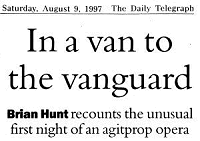
The show may be the same - Marc Blitzstein's The Cradle Will Rock - but the opening at the Battersea Arts Centre on August 12, 1997 cannot rival the Broadway opening of June 16, 1937. It is not a matter of budgets; it would be difficult to imagine a more sparse presentation than the premiere 60 years ago.www.gina-shop.com But the original opening night has become a theatrical legend.
Blitzstein's new opera had been taken up by Orson Welles and John Houseman, with a cast that would form the nucleus of the Mercury Theater.
In 1937, however, the controlling body was the US government-sponsored Federal Theater Project. Its administrators became concerned when they discovered that The Cradle Will Rock dealt with issues of unionisation within the steel industry which were all too current and controversial.
A week before opening, the plug was pulled, the show effectively banned. Welles and Houseman however, were undeterred. Audience and cast were asked to turn up outside the locked and guarded theatre.
John Jansson, music director of an the 1997 production, takes up the story.
"The Musicians' Union instructed their members not to go into the pit. The Actors Union instructed theirs not to go on stage. So it was decided to find another space where Blitzstein would play through the score and give a reading.
"An upright piano was stuck on the back of a van, and the van told to circle the block until they found somewhere. Eventually an empty theatre was discovered 20 blocks up town. So everyone headed there, to find Blitzstein sitting on stage with the piano - as a member of the union he was banned from the pit, not the stage. When the cast and audience had assembled in the stalls, he began playing.
"Then the woman who had the opening number stood up and started singing, tremulously. Cast members joined in one by one. So the whole opera was given, Blitzstein on stage, the cast dotted around the auditorium. Houseman said that watching the audiences heads was like watching a crowd at a tennis match."
This sensational evening made a celebrity of Marc Blitzstein (1905-64) - an expensively educated, Philadelphia-born composer who turned Left in the Thirties and never looked back. The Federal Theater Project's disengagement is understandable, the union hostility less so. Why were the directives so specifically worded as to leave obvious loop-holes? Perhaps the behind-the-scenes involvement of that arch-controversialist entrepreneur Orson Welles has been underestimated.
What does The Cradle Will Rock offer an audience in Blair's Britain? As Jansson admits, "Its optimism about the future of socialism and unionism probably seems dated. However, features of the plot which appear artificial gestures actually resemble the social history that led up to the piece being written.
"Factory owners attempted to buy the affections of their workers by forming benevolent schemes over which they had entire control. They introduced 'yellow-dog' contracts, whereby you'd earn a living on the condition you didn't join a union. Of course that has a relevance today; I think a lot of British Airways employees would find it familiar."
Director Mehmet Ergen insists that the work stands as drama even if "political preaching to the converted is not the current fashion in theatre. It opens with a prostitute girl being arrested. Another policeman arrests another eight people, all respectable figures in society. By the second scene we realise it is a mistake, they shouldn't be in police headquarters, whereas the prostitute should.
"Just as we think it has all been sorted out a shop-keeper, panerai replica who seems to get arrested every night, says they are all prostitutes in their own way. And we find out why. So dramatically it is well constructed - musically even more so."
Jansson agrees: "The music is very sophisticated, as you'd expect given Blitzstein's training - he studied with Schoenberg and Boulanger. But he has created a style that is popular without being simplistic or patronising."
Blitzstein was both an insider (a friend of Copland, Bernstein, Thomson, Foss) and an outsider (openly communist and homosexual) on the twentieth-century US music scene. When the left-wing, largely gay intelligentsia of which he was a member drifted back to the establishment, he stuck to his guns. As Ergen puts it, "you would never have found him fooling around with Romeo and Juliet as Bernstein did in West Side Story."
Well-liked by all who knew him, Blitzstein became something of a hero and conscience to Bernstein. When, in 1964, Blitzstein was beaten to death by three sailors he picked up in a Martinique bar (for the sake of the 400 dollars in his wallet), Bernstein's mourning was lavish. Arguably, in Blitzstein's political and sexual frankness he recognised an integrity he had himself compromised.
Though he wrote more music theatre, Blitzstein never experienced again the popular attention brought to him by The Cradle Will Rock.
"The great thrust that opening night gave the piece also caused some of its qualities to be overlooked," says Jansson. "All the significant productions have been done with just piano and no props. But it wasn't conceived that way. Welles had a big design, with trucks rolling on and off to set each scene. There's an orchestral score, deftly done, full of colours."
So will the Battersea Arts Centre production recreate the ambitious staging originally intended? Ergen smiles wryly and Jansson says: "There's neither the space nor the money." With agitprop, some things never change.